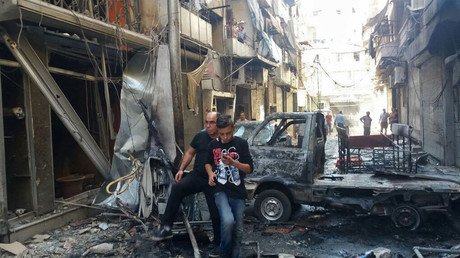Washington has “suspended” bilateral contacts with Moscow over the Syrian crisis, the US State Department said. Russian Foreign Ministry said it was "disappointed" by the decision and accused the US of seeking to shift blame for its own failure in Syria.
US officials had threatened for a week to withdraw from the Syrian peace process, after the latest ceasefire negotiated by Foreign Minister Sergey Lavrov and Secretary of State John Kerry collapsed amid bloody fighting.
While contacts between US and Russian military to “deconflict” encounters between their aircraft in Syrian skies will continue, the US is withdrawing personnel that was dispatched for the purpose of setting up the Joint Implementation Center (JIC) for the ceasefire, agencies reported citing the State Department.
There is "nothing more for the US and Russia to talk about" in Syria, White House spokesman Josh Earnest told reporters on Monday.
Russia has made efforts to preserve the September 9 ceasefire agreement, while repeatedly urging Washington to live up to its obligations, the Foreign Ministry in Moscow said on Monday.
“It turns out that Washington has failed to fulfill the key condition of the agreement to ease humanitarian situation for the residents of Aleppo” said Foreign Ministry spokeswoman Maria Zakharova. “And now, apparently, having failed to honor these agreements that they themselves worked out, [the US] is trying to shift the blame.”
The JIC would have been located in Geneva, Switzerland, with the purpose to coordinate military cooperation and intelligence-sharing between Russia and the US-led coalition fighting Islamic State (IS, formerly ISIS/ISIL) in Iraq and Syria.
Washington has dragged its feet on setting up the JIC, however, with State Department spokesman John Kirby telling reporters on September 16 that its establishment was contingent on humanitarian aid reaching Aleppo, while the Chairman of the Joint Chiefs of Staff, General Joseph Dunford, told lawmakers the US had “no intention of having an intelligence-sharing agreement with the Russians.”
On Monday, Russian President Vladimir Putin suspended Moscow’s participation in a program for disposing of plutonium from decommissioned nuclear warheads, citing “the radical change in the environment, a threat to strategic stability posed by the hostile actions of the US against Russia, and the inability of the US to deliver on the obligation to dispose of excessive weapons plutonium under international treaties.”
The White House called the decision “disappointing.”
“This is not a decision we took lightly,” State Department spokeswoman Elizabeth Trudeau told reporters Monday afternoon, claiming that Russia had not lived up to its obligations under the ceasefire agreement.
Asked if the US fulfilled its own obligation to separate the so-called moderate opposition from terrorists, Trudeau replied, “We believe we did.”
“We had detailed negotiations with the opposition, emphasizing the importance of ‘demarbleizing’ [sic] from Al-Nusra,” Trudeau said, clarifying Washington’s official stance that “Nusra is Al-Qaeda, they are a terrorist organization.”
RT’s Gayane Chichakyan reminded Trudeau that several major rebel groups refused outright to abide by the ceasefire.
“We expected good faith efforts, not only from rebel groups on the ground… but also Russia,” Trudeau replied. “If attacked, opposition groups have the right to defend themselves.”
Separating the rebels from Al-Qaeda elements was the primary obligation of the US under the ceasefire arrangement, Max Abrahms, counterterrorism expert at Northwestern University, told RT. “This is the main thing that the US promised to do, and the US frankly did not do it.”
On the other hand, the US expected Russia to influence the Syrian government to pause operations against the US-backed rebels. “That really didn’t happen either,” Abrahms said, adding that he would prefer to see continued cooperation between the US and Russia to defeat the terrorists.
Washington’s primary focus in Syria was the fight against IS and “helping those most in need within Syria,” Trudeau told reporters on Monday.
A new UN report has blamed the extremely dire humanitarian situation in Syria on the sanctions imposed by the EU and the US. The sanctions are “the most extreme and far-reaching that have been imposed than any sanctions regime they can think of,” investigative journalist Rania Khalek told RT, adding she was told by the State Department that “any humanitarian issues that have arisen in Syria are all to be blamed on the Syrian government.”
The sanctions are “destroying the Syrian economy,” said Khalek, who published the leaked UN report.

